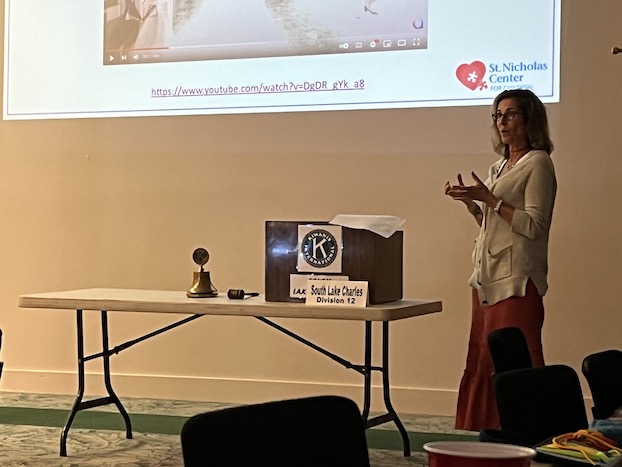AUTISM AWARENESS MONTH: Understanding and supporting the families
Published 5:00 am Sunday, April 24, 2022

- Michelle Kramer, therapy supervisor at the St. Nicholas Center for Children, speaks Tuesday to members of the Kiwanis Club of South Lake Charles. (Crystal Stevenson / American Press)
Autism spectrum disorder is a developmental disability that may affect how people behave, communicate, interact and learn.
“When we look at individuals with autism, all we can see is the outside effects of what they’re going through and we don’t understand or see what is happening for them on the inside,” Michelle Kramer, therapy supervisor at the St. Nicholas Center for Children, said. “What they’re experiencing is sensory overload.”
Kramer said individuals gather information about the world around them through their senses — vision, hearing, sight, smell and taste — and then use them to relate what is important and what isn’t and what they need to filter out and what they need to focus on.
“Individuals on the spectrum don’t have that regulation,” she said. “A lot of time they have over sensitivity and every sensory experience is taken in at the same time and their body and their mind can’t handle it. What happens is they close up and go inside themselves because that’s their safety spot.”
When that happens, they can’t hear what’s going on around them or focus on comforting words being shared with them, she said.
“There’s too many things going on that they’re figuring out how to regulate,” Kramer said.
At the St. Nicholas Center, Kramer teaches students and their families how to control that sensory information.
“If we can get their sensory information in control then we can gain their attention and they can let go of other things and they can listen to words and we can try and build from that to the other deficits that they struggle with, like communication. If you can’t put everything else aside and understand the language someone else is speaking to you then you can’t communicate with other people, and certainly not with your words.”
Kramer said autism is called a spectrum disorder because there are a wide range of struggles — such as social aspects and sensory input.
“Really, if you think about it, we all have some sort of sensory dysregulation; there’s something for all of us that grates our nerves that doesn’t affect other people,” she said. “There’s lot of people who can’t stand the squeakiness of a wheel or fingernails on a chalkboard, but they figure out a way to manage it.”
Kramer said for those with autism, it can be hard to focus because everything else gets in the way. They also struggle with social cues, facial expression, sarcasm and behavior.
“We have families in our community who want to get out and be in the community and go to church and want to go to restaurants and the grocery store and live their lives and want to include their kids in everything that they do,” Kramer said. “But the struggles that they have, they carry with them to church and the grocery store and we need to bridge that gap to acceptance of knowing that this kiddo might have a bit of a struggle right now in a public place. These parents are doing everything they can and these kiddos are going through things we can’t even imagine.”
Christy Papania-Jones, founder and executive director of the St. Nicholas Center, is mother of an autistic son.
“You can’t pick out a child with autism out of a photograph,” she said. “There’s no marker, so oftentimes parents and their children are misjudged. People say you need to spank them or to control your child and it’s things like that that makes some families confine themselves to their home.”
She said those families are in dire need of support and that’s the message the center is spreading during Autism Awareness Month.
“These families are exhausted and they really do need the support of the community with everything they have going on,” she said. “I asked families specifically what challenges they face and it was being confined to their homes because behavioral issues can be unpredictable. Things upset their children in the outside world, it just happens, and they have a lot of issues with being judged. It seems simple, but one mom said a smile can go a long way.”
Papania-Jones said the center’s goal is to transform the lives of children with autism and any delay or disorder by providing therapy and family support. The center hosts fundraisers and events throughout the year to offset the cost of therapy for families in need.
Since Hurricane Laura made landfall in 2020, the center is being housed in temporary buildings on Ihles Road.
She said the center’s building on Ryan Street was completely destroyed in the interior during the storm.
“On the outside we thought we were safe,” Papania-Jones said. “We saw a video and we had people go by and look and on the outside it looks OK. But by the time someone made it inside of the site it looked like a Buick had fallen through the ceiling.”
“We’re not up to capacity because our space is so limited,” she said. “We had more than 100 children before the storm and now we have 67 with too many people on waiting lists, unfortunately.”




